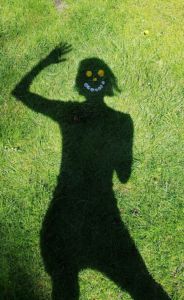How to Write Funny: get started writing comedy

So… you think you’re funny?
Then there’s a good possibility you are – human beings naturally use banter and make jokes when in social interactions. This helps us to bond with family and friends, release endorphins and generally make us feel more content. Think about your own personal interactions and how much more engaging they can be when people make jokes or make you laugh.
Humans like laughing so much that many have developed careers in just making others laugh, but purposely trying to make people laugh can be a daunting task. You may regularly put your friends in stitches in conversation but making people laugh via the written word can be hard. But go on; give it a try! Haul yourself out of your comfort zone. You’ll flex some of those underused writing muscles and add a new layer to your work. Here are a few handy hints to get your readers chortling.
Genre
What are you writing about? Consider your subject matter and then explore ideas of how humour could feature. Even dark subjects can elicit a laugh or two so it doesn’t necessarily have to be a comedy piece. If you’ve ever read Joseph Heller’s Catch 22, you’ll remember his take on the Second World War. As harrowing as the depiction of war is, the protagonist’s situation is funny for its farcicality. He fears his commanding officers more than the German enemy as they keep increasing the number of missions he must complete before being allowed home. This combination works well as does the collision of stark reality and the surreal.
When writing your story, be clear on it so that your readers aren’t confused i.e. avoid slapstick comedy in a novel about a gruesome murder. It probably won’t work.
Authenticity
 Always follow your instinct. If it doesn’t make you laugh then chances are it won’t make anyone else laugh either. Readers will pick up on signs that you are trying too hard and the joke will fall flat. A good test it is to try it out on friends and family first to gain some insight.
Always follow your instinct. If it doesn’t make you laugh then chances are it won’t make anyone else laugh either. Readers will pick up on signs that you are trying too hard and the joke will fall flat. A good test it is to try it out on friends and family first to gain some insight.
Your writing should always reflect you so draw on your own experiences and conversations that you have found funny. Use these directly or to spark inspiration. There’s no need to stick to the story exactly so exaggerate and see where it takes you.
Rhythm and language
Should I be laughing at this? Narrative rhythm and pacing is important to comedy and can be an indicator of whether something is meant to be funny or not. There are different ways of employing these. For example, try clustering jokes together to increase their impact as a stand-up comedian might do. Creative language and embellishment can also work well.
A successful tool in comedy is relatability. If a scenario is recognisable, it’s much more likely to trigger an emotional connection with the reader. That’s why observational comedy is often such a hit. Everyday, mundane situations can be hysterically funny when framed in the right way.
Another technique is to introduce a joke at the beginning of a chapter, essay, etc. and make reference to it at the end for delayed gratification.
Study
As with most things, the best way to achieve success is to familiarise yourself with a subject and understand how it works. Read some funny books; try a mix of fiction and non-fiction. Watch some stand-up shows. Get inspired by listening to BBC Radio 4 Extra’s Newsjack – a funny take on the week’s news stories. You can even submit your own material! For a more structured learning experience you could take a comedy writing course.
Take the time to study humorous writing in all its forms and the different tools and techniques writers use to amuse their readers.
 Comedy is not a one size fits all. Different things make different people laugh so you’ll never be able to please everyone. Simply aim to appeal to your target audience.
Comedy is not a one size fits all. Different things make different people laugh so you’ll never be able to please everyone. Simply aim to appeal to your target audience.
If you’re looking for a laugh out loud treat, look no further than Wake Up, Sir! by Jonathan Ames. It had me howling. Enjoy!
Finally, to finish this article – let’s look at a short video of clips from the comedian Groucho Marx. He is still considered to this day, to be one of the best when it came to delivering one-liners, wisecracks or just funny jokes. (It is very of its time, so be warned, sexism is present.) He is not known as well today as he was in the 30s or 40s, but he really should be considered as someone to study when writing comedy.





Leave A Comment